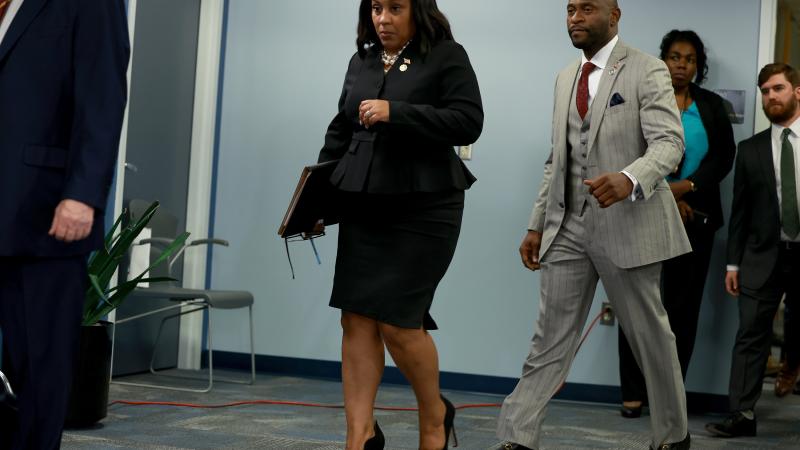Conservative professor threatens lawsuit over suspension as free speech disputes rage on campuses
Penn did not punish blood libel against Jews, tacit call for second Holocaust, celebration of CEO's murder, Amy Wax's lawyer says. LSU squeezed between GOP governor, free speech group on professor who slurred Trump-voting students.
One tenured law professor claimed her school's black students lagged in academic performance and praised immigrants from Europe as opposed to Asia because of the latter's "mystifying" support for Democrats. Two years after lawmakers demanded it fire her, the school approved sanctions short of termination.
Another tenured law professor told his class, the day after the election, that any students who voted for Donald Trump must "prove" they aren't racist because black students already "don't feel welcome here." His governor is trying to get him punished.
University of Pennsylvania tenured law professor Amy Wax is now threatening to sue the Ivy League school if it doesn't rescind her sanctions, which include a yearlong suspension in the 2025-2026 academic year, claiming it did not similarly sanction professors for antisemitic speech and even celebrating the murder of UnitedHealthcare CEO Brian Thompson.
It's not clear whether Louisiana State University has taken any action against Nicholas Bryner since GOP Gov. Jeff Landry publicly demanded it sanction the law professor for allegedly violating Landry's executive order protecting students from faculty "retribution" based on their political beliefs and encouraged students to report similar incidents to state Attorney General Liz Murrill.
The Foundation for Individual Rights and Expression has defended both faculty, telling Just the News that Penn and Landry each imposed "an amorphous standard" that treats faculty speech as imposing "a chilling effect and the spectre of discrimination" on students "without any concrete evidence of such."
It's also representing University of Washington computer science instructor Stuart Reges, who was assaulted for recording anti-Israel campus protests this spring, in a First Amendment retaliation suit over the parody "land acknowledgment" in his syllabus.
A trial court threw out the suit, finding the parody caused a "significant disruption" that justified UW removing and reposting a sanitized version of the syllabus and banning Reges from teaching a required introductory course as well as an honors section.
Free speech groups from left-leaning PEN America to right-leaning Manhattan Institute and libertarian Students for Liberty filed friend-of-the-court briefs this fall asking the 9th U.S. Circuit Court of Appeals to reinstate FIRE's lawsuit on behalf of Reges.
"A university is an intellectual gymnasium" and administrators removing controversial speech is like a gym removing weights when "a few vocal gym members complain that weightlifting is too hard," the Pacific Legal Foundation told the appeals court.
Wax's lawyer Jason Torchinsky told Penn on Dec. 12 in a letter that it had a week to "formally and conclusively disavow imposition of the proposed discipline" on his client or she would sue.
Penn's enforcement of its speech policies against Wax constitute race-based discrimination in federally funded programs and employment discrimination on the basis of race in violation of the Civil Rights Act, he wrote.
It also violated Pennsylvania contract law for breaking its promise to follow the First Amendment and its own "procedural requirements and protections" for accused faculty, and the Americans with Disabilities Act for not accommodating "Wax’s then-ongoing cancer treatments adequately (or even minimally)," Torchinsky wrote.
Penn did not punish faculty for "far more egregious" speech, he said: a political cartoon that shows American Jews drinking blood from glasses marked "Gaza," reportedly chanting for "only one solution" against Israel at a rally, and publicly praising Thompson's accused murderer Luigi Mangioni as the "icon we all need and deserve."
"The proposition that Professor Wax’s speech merited disciplinary action based on the putative 'harm' caused by her speech—but none of the foregoing instances did—is preposterous," wrote Torchinsky, former counsel to the assistant attorney general for civil rights in former President George W. Bush's Justice Department.
Penn didn't respond to a request for comment.
Wax's claims about black student performance, which tacitly impugned Penn Law's admissions standards, were so threatening to the school that it accused her of lying for four years while refusing to ever provide the supposedly correct figures.
Former tenured Vanderbilt law professor Carol Swain similarly blamed "liberal racism" for a culture of victimization and entitlement among scholars such as Claudine Gay, whose alleged plagiarism of fellow black woman Swain's work guaranteed her exit as Harvard's president after Gay said genocidal campus chants against Jews were protected.
Swain told the "Just the News, No Noise" program that she wrote her new book on "Harvard, plagiarism and the death of academic integrity" because Harvard and Gay could have bankrupted her for filing an allegedly "frivolous lawsuit" to protect Swain's copyright.
Gay has admitted she failed to attribute certain passages in her academic writings and began to see corrections after the plagiarism allegations surfaced last year but she insisted they were not intentional.
"I have never misrepresented my research findings, nor have I ever claimed credit for the research of others. Moreover, the citation errors should not obscure a fundamental truth: I proudly stand by my work and its impact on the field," she wrote in a New York Times OpEd in January.
FIRE called out Landry, who once sued the federal government for alleged censorship-by-proxy, for pressuring LSU to punish Bryner for his comments about students who voted for Trump.
"Any action against Professor Bryner for his brief remarks–by LSU or its board–would set the university up for a First Amendment lawsuit," and officials would likely lose qualified immunity for ignoring "clearly established" Supreme Court precedent protecting academic speech "even in times of seemingly existential crisis," FIRE warned the university on Thanksgiving Eve.
Bryner did not respond to a Just the News query on what if anything LSU had done in response to Landry's pressure.
FIRE similarly went to bat this semester for University of Kansas instructor Phil Lowcock for telling students of his frustration with men who refuse to vote for a female presidential candidate. "We could line all those guys up and shoot them," Lowcock said in a class recording that went viral, followed by his suspension and then unexplained departure.
It's not clear whether Lowcock is contemplating action similar to Wax. He has not lodged any discernible social media presence since his LSU departure, and FIRE fellow Graham Piro told Just the News the group didn't know of his plans.
Wax and Lowcock are "just two examples of the erosion of academic freedom happening right now" that scare faculty into self-censorship, Piro wrote in an email, citing FIRE's recent survey of 6,000 faculty that found a nearly a quarter fear firing based on misunderstandings of their expression.
The Facts Inside Our Reporter's Notebook
Links
- "mystifying" support for Democrats
- lawmakers demanded it fire her
- yearlong suspension in the 2025-2026 academic year
- GOP Gov. Jeff Landry publicly demanded it sanction
- Penn and Landry each imposed "an amorphous standard"
- "a chilling effect and the spectre of discrimination
- assaulted for recording anti-Israel campus protests
- First Amendment retaliation suit over the parody
- A trial court threw out the suit
- UW removing and reposting a sanitized version
- left-leaning PEN America
- right-leaning Manhattan Institute
- libertarian Students for Liberty
- friend-of-the-court briefs this fall
- Pacific Legal Foundation
- Wax's lawyer Jason Torchinsky told Penn Dec. 12
- Torchinsky, former counsel to the assistant attorney general
- it accused her of lying for four years
- Carol Swain similarly blamed "liberal racism"
- plagiarism of fellow black woman Swain's work
- Swain told the Just the News, No Noise program
- FIRE called out Landry
- FIRE warned the university on Thanksgiving Eve
- FIRE similarly went to bat
- unexplained departure
- FIRE's recent survey of 6,000 faculty
















